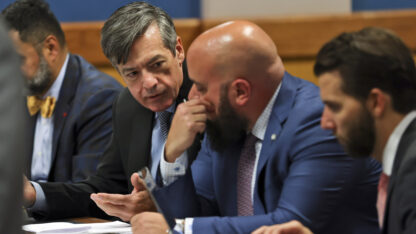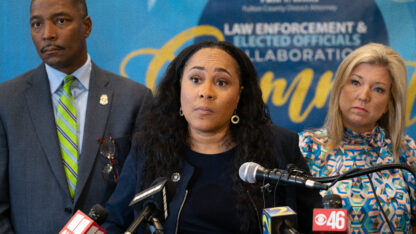Defense attorneys and prosecutors sparred Monday over questions for potential jurors who have to report later this week for the trial of Sidney Powell and Kenneth Chesebro, who are accused along with former President Donald Trump and others of illegally trying to overturn the 2020 election in Georgia.
Lawyers for Powell and Chesebro met with prosecutors and the judge overseeing the case to hash out what will be asked on a lengthy questionnaire when the first group of 450 prospective jurors arrives at the courthouse on Friday. Whether that should include questions about their opinions about potential witnesses, the other defendants and issues that go to the heart of the case dominated that discussion.
Powell and Chesebro were indicted in Fulton County in August along with Trump and 16 others, accused of participating in a wide-ranging scheme to illegally try to keep Trump, the Republican incumbent, in the White House even though he had lost the presidential election to Democrat Joe Biden. All 19 defendants initially pleaded not guilty, but one pleaded guilty last month to five misdemeanor charges after reaching a deal with prosecutors. Trump and the remaining 15 will not be tried with Powell and Chesebro, and a trial date has not yet been set for them.
Powell and Chesebro, both attorneys, each exercised their right to demand a speedy trial, and Fulton County Superior Court Judge Scott McAfee set their trial to begin Oct. 23. In a later order, the judge wrote that individual questioning of prospective jurors would begin on that date but that 450 people would be summoned to the courthouse this Friday, Oct. 20, to complete a juror questionnaire under oath.
Powell is accused of participating in a breach of election equipment in rural Coffee County. She’s alleged to have hired and paid a computer forensics team that copied data and software from the election equipment without authorization.
Chesebro is accused of working on the coordination and execution of a plan to have 16 Georgia Republicans sign a certificate declaring falsely that Trump won and declaring themselves the state’s “duly elected and qualified” electors.
During Monday’s hearing, the judge walked through parts of the draft juror questionnaire, focusing mostly on parts where one side or the other had made changes and where there were disagreements between the two sides. He said he still needed to think about some issues and would send the parties a final questionnaire later in the week.
Rather than asking whether prospective jurors can be fair and impartial toward Powell and Chesebro, defense attorneys proposed asking about their specific opinions on the two. Most people, when asked if they can be fair and impartial, will instinctively say yes, Powell attorney Brian Rafferty told the judge.
McAfee expressed concern about sections that he said asked prospective jurors to give a favorability rating for the other defendants in the case and some of the expected state witnesses. Prosecutor Alex Bernick also objected to that section, saying the other defendants are not on trial. Rafferty argued that prosecutors, citing the racketeering charge all defendants face, have said they intend to present their whole case.
Both sides agreed potential jurors could be asked about pressures from the community or whether they would feel nervous or anxious about returning any verdict out of concern for how the public might respond. The judge noted that a potential juror’s answer wouldn’t necessarily be disqualifying but acknowledged the parties might want to consider that information in striking jurors.
Defense attorneys also wanted to include a string of questions about whether potential jurors believe Trump and his associates tried to steal the election and what they think about people who spread misinformation or tried to help overturn the election. Bernick argued those questions were basically meant to test defense theory and see what jurors are receptive to before putting on their case.
Chesebro attorney Scott Grubman said he could see why such questions might be barred in a normal case, but he argued that this case is unprecedented and “has no parallels in American or Georgia jurisprudence.”
McAfee seemed unconvinced, saying the questions seemed to cross a “hard line in the sand” against asking prospective jurors whether they think someone is guilty or not.
In his order separating Powell and Chesebro’s cases from the others, McAfee said he will try to have their jury seated and sworn by Nov. 3, “to eliminate any doubts that the statutory speedy trial deadline has been met.” Under Georgia law, a defendant who files a demand for a speedy trial has a right to have a trial begin within the court term when the demand is filed or in the next court term. Court terms in Fulton County are two months long and begin the first Monday in January, March, May, July, September and November.
During a hearing last month, McAfee said that starting Oct. 23, they will bring prospective jurors in in panels of 14 to be questioned individually. For each panel, the judge will ask questions to determine whether jurors have qualifying hardships that would keep them from being able to serve as a juror. Then each party — the two defendants and the district attorney’s office — will have one hour per panel of 14 prospective jurors to ask questions.
Ideally, McAfee said, they will have one panel of 14 in the morning and another panel of 14 after lunch each day. To ensure that they have enough potential jurors, McAfee has requested that another 450 people be brought in on Oct. 27 to fill out questionnaires.









